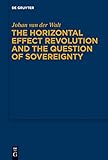The Horizontal Effect Revolution and the Question of Sovereignty / Johan van der Walt.
Material type: TextPublisher: Berlin ; Boston : De Gruyter, [2014]Copyright date: ©2014Description: 1 online resource (428 p.)Content type:
TextPublisher: Berlin ; Boston : De Gruyter, [2014]Copyright date: ©2014Description: 1 online resource (428 p.)Content type: - 9783110248029
- 9783110391701
- 9783110248036
- 341.26 22/ger
- KJC5132 .V359 2014
- KJC5132
- online - DeGruyter
| Item type | Current library | Call number | URL | Status | Notes | Barcode | |
|---|---|---|---|---|---|---|---|
 eBook
eBook
|
Biblioteca "Angelicum" Pont. Univ. S.Tommaso d'Aquino Nuvola online | online - DeGruyter (Browse shelf(Opens below)) | Online access | Not for loan (Accesso limitato) | Accesso per gli utenti autorizzati / Access for authorized users | (dgr)9783110248036 |
Browsing Biblioteca "Angelicum" Pont. Univ. S.Tommaso d'Aquino shelves, Shelving location: Nuvola online Close shelf browser (Hides shelf browser)

|

|

|

|

|

|

|
||
| online - DeGruyter Transformation von Diktaturen in Demokratien und Aufarbeitung der Vergangenheit : Humboldt-Kolleg an der Universidad Pablo de Olavide 7. bis 9. Februar 2008 / | online - DeGruyter Die Auseinandersetzung einer Gesellschaft oder Gemeinschaft nach § 84 InsO / | online - DeGruyter Examinatorium Allgemeiner Teil des BGB und Handelsrecht / | online - DeGruyter The Horizontal Effect Revolution and the Question of Sovereignty / | online - DeGruyter Die Rückforderung von Schenkungen wegen Verarmung / | online - DeGruyter Entstehung des Gesetzes über Internationale Rechtshilfe in Strafsachen (IRG) / | online - DeGruyter Der Minderheitsschutz im Gesellschaftsrecht / |
Frontmatter -- Preface -- Contents -- Acknowledgements and Disclaimers -- Introduction -- Part One: Horizontal Effect -- Chapter One: Erased Baselines and Inversed Coordinates: 19th Century Backgrounds of the Horizontality Question -- Chapter Two: Twelve Pivotal Cases -- Chapter Three: State Action -- Chapter Four: Drittwirkung -- Part Two: Sovereignty -- Chapter Five: Uninterrupted Sovereignty -- Chapter Six: Différantial Sovereignty -- Chapter Seven: Sovereignty and the Dual Destiny of Lüth in Europe -- Chapter Eight: Liberal Democratic Constitutional Review -- Bibliography -- Abbreviations -- Index of Persons -- Subject Index
restricted access online access with authorization star
http://purl.org/coar/access_right/c_16ec
That the recent turn in European Constitutional Review has effectively brought about a revolution in European law has been observed before. At issue are two major developments in European judicial review. On the one hand, the European Court of Human Rights has been collapsing traditional boundaries between constitutional law and private law with a series of decisions that effectively recognized the "horizontal" effect of Convention rights in the private sphere. On the other hand, the European Court of Justice has also given horizontal effect to fundamental liberties embodied in the Treaty on the Function of the European Union in a number of recent cases in a way that puts "established" boundaries between Member State and Union competences in question. This book takes issue with these developments by bringing to the fore a key issue that the horizontality effect debate has hitherto largely overlooked, namely, the question of sovereignty. It shows with detailed references to especially the American debate on state action and the German debate on Drittwirkung that horizontal effect cannot be understood consistently without coming to grips with the conceptions of state sovereignty that inform different approaches to horizontal effect.
Mode of access: Internet via World Wide Web.
In English.
Description based on online resource; title from PDF title page (publisher's Web site, viewed 29. Nov 2021)


